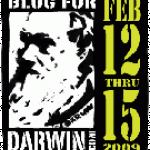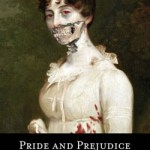Littademia
While reading the New Yorker yesterday I came across this gem of a quote from the late John Updike, which eloquently expresses one of the ideas I was reaching for in my own Darwin Day post.
The non-scientist's relation to modern science is basically craven: we look to its discoveries and technology to save us from disease, to give us a faster ride and a softer life, and at the same time we shrink from what it has to tell us of our perilous and insignificant place in the cosmos. Not that threats to our safety and significance were absent from the pre-scientific world, or that arguments against…
One Seth Grahame-Smith appears to be - ahem - reviving the Austen oeuvre with his own personal touch: zombies.
Feisty heroine Elizabeth Bennet is determined to wipe out the zombie menace, but she's soon distracted by the arrival of the haughty and arrogant Mr. Darcy. What ensues is a delightful comedy of manners with plenty of civilized sparring between the two young lovers--and even more violent sparring on the blood-soaked battlefield as Elizabeth wages war against hordes of flesh-eating undead.
Mark your calendars now for this one, because if he can actually sustain the conceit for the…
Ephraim Chambers
Cyclopaedia, 1728
Via Morbid Anatomy, some beautiful detail images from Ephraim Chambers' Cyclopaedia:
Cyclopaedia: or, A Universal Dictionary of Arts and Sciences (folio, 2 vols.) was an encyclopedia published by Ephraim Chambers in London in 1728, and reprinted in numerous editions in the 18th century. The Cyclopaedia was one of the first general encyclopedias to be produced in English. (source: Wikipedia
Read more at Morbid Anatomy.
Following up on last month's buzz about the Internet killing literacy, this NYT article baldly states,
Clearly, reading in print and on the Internet are different. On paper, text has a predetermined beginning, middle and end, where readers focus for a sustained period on one author's vision. On the Internet, readers skate through cyberspace at will and, in effect, compose their own beginnings, middles and ends.
Yes, internet reading is nonlinear. Yes, it may be tied to some disturbing trends in youth literacy (the article cites the same National Endowment for the Arts data and Atlantic…
Woo hoo! I've been tagged with a book meme!
The rules: boldface the books on this list that you've read, and italicize books you started but never finished.
Okay. . .
1 Pride and Prejudice - Jane Austen
2 The Lord of the Rings - JRR Tolkien
3 Jane Eyre - Charlotte Bronte~
4 Harry Potter series - JK Rowling
5 To Kill a Mockingbird - Harper Lee~
6 The Bible - I think I've read over 75% of this, so I'm going with it. The begats don't count.
7 Wuthering Heights - Emily Bronte~
8 Nineteen Eighty Four - George Orwell
9 His Dark Materials - Philip Pullman
10 Great Expectations - Charles Dickens~…
"Sonnet: To Science"
words by Edgar Allan Poe
song by Alex Colwell
video by Jeff Burns
From oilcanpress
I love the pairing of Poe's sonnet, which basically accuses Science of destroying the poetic mysteries that make life meaningful, with the techno-optimistic nostalgia of early films glorifying science and technology. Yummy!
Poe had a curious relationship with science. Despite the accusatory tone of his poem, Poe was fairly well-versed in contemporary scientific theory, with a solid grasp of astronomy in particular. Poe even wrote a small book called Eureka (1848) about his early,…
Any recent decline in the popularity of reading, especially reading long books, appears to have totally bypassed Ammon Shea. Shea recently spent a year reading the Oxford English Dictionary, and his book about the experience, Reading the OED: One Man, One Year, 21,730 Pages, drops today.
When I first heard about Shea's project, I wasn't especially inspired. What is an "expert dictionary reader" anyway? And who wants to read a book about reading a book - especially a dictionary? It's not that I don't love dictionaries. I keep a massive unabridged Funk & Wagnalls flopped open in my…
My friend Rhett alerted me to this little word game, which is kind of like Balderdash: you pick the correct etymology or definition from a group of fakes created by tricky readers. I did quibble with a couple of mistakes (one definition was off, one word was misspelled) but I tried three times and couldn't beat it. Can you?
Other wordy recreations:
this is my all-time favorite hard online word quiz. . . I scored 183 and broke a sweat doing it.
this is an addictive Boggle-style game from Flash By Night.
Via Rag & Bone Blog
By Christopher Tovo
Are we falling out of love with books?
I realized a little while ago - when yet another book arrived from Amazon and was thrown on the to-read pile - that I'm no longer the bibliophile I once was. I love the idea of reading books, but I'm not making time to do it. Recent fiction isn't appealing - I don't seem to have the patience or interest. (I feel like Jessica Crispin in that respect). And nonfiction, which I have been reading occasionally, seems too much like a part of my job.
I'm really disturbed by this trend. I self-identify as a devoted…
Plate XVIII, 2002
Selena Kimball
From The Dreaming Life of Leonora de la Cruz
More disquieting collage art - this time from Selena Kimball. Her collage illustrations from The Dreaming Life of Leonora de la Cruz by Agniezka Taborska depict the surreal, sinister visions of a fictional 18th century Carmelite nun. I feel like I should make a creepy sound effect of some kind, but the collages are so lovely, it seems disrespectful. . . check out the subtle use of biological imagery throughout.
Plate II, 2000
Selena Kimball
From The Dreaming Life of Leonora de la Cruz
One of the questions an artist hates most is what is your artwork worth? Price is a subjective, unsatisfactory proxy for emotional angst, frustration, eyestrain, and time. Sometimes I find that NO (reasonable) value can compensate for the emotional investment I've made - in which case I either keep the thing myself, give it away, or throw a tantrum and rip it up. Other variables also influence price - the artist's fame and skill, obviously, but also whether the work has been copied. People are willing to pay a premium to own original art, even if a reproduction is virtually identical in…

